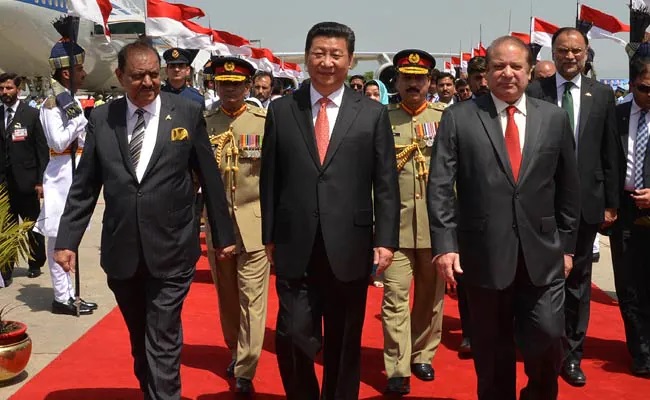
Written by: Waseem Abbas
Posted on: May 31, 2023 |  | 中文
| 中文
Mushahid Hussain Sayed, Chairman Pakistan China Institute (PCI), Islamabad, receiving '5 Principles of Peaceful Coexistence' award from President Xi Jinping in April 2015
Apart from Mao Zedong and Deng Xiaoping, no statesman in China has influenced Chinese polity and society as much as the current president and paramount leader of the Communist Party of China (CPC), Xi Jinping. It is befitting to say that personalities shape politics and influence policies that ultimately shape the country’s future. Mao's emphasis on the Chinese brand of socialism and Deng's economic reforms, brought China immense progress. However, it is Xi Jinping, who was born in 1953 in Beijing, is taking China to a more assertive role in international politics, while carrying out market reforms internally.
Xi Jinping's economic policy is characterized by the encouragement of entrepreneurship and a limited free market economy, albeit, under the direction of the CPC, which is known as “Socialism with Chinese Characteristics”. According to Xi, the current economic systems around the world have deep capitalist roots, and one cannot eradicate its influence overnight. To achieve communism, which is the ultimate aim of the CPC, the economic systems must be reconciled with communist ideals as much as possible, and as the vanguard party, the CPC will oversee its implementation in China. China, as per Xi, is in the first stage of communism, where the CPC will aim at improving the life standards of common people through infrastructural development, technological advancement and sustainable, ‘green development’. The immediate goal for President Xi Jinping is the ‘Chinese Dream of National Rejuvenation’ by the year 2049, which marks 100 years since the Chinese Revolution of October 1, 1949.
‘Chinese Dream of National Rejuvenation’, or simply ‘Chinese Dream’, denotes Xi Jinping’s desire to see China making advances towards becoming a global power by the year 2049. The “Chinese Dream” aims to restore China’s historical position when just three centuries ago, China used to contribute almost 30% of global GDP. It aims to achieve its stated goal through economic development of China, increasing social mobility and cohesion, imbibing pride in Chinese culture and fostering technological innovation. Xi's goal of the ‘Chinese dream’ cannot be achieved if China remains isolated internationally. China, therefore, has embarked on global initiatives, such as the Belt and Road Initiative (BRI), with 145 countries signing on to the BRI.
It was Xi Jinping's foresight that he saw a global role for China and paved the way for its implementation through various trans-continental projects, such as the Belt and Road Initiative (BRI). BRI, unveiled by President Xi in 2013, aims to connect China with Asia, Europe and Russia, both through land and sea routes, which will foster economic cooperation and development, increase trade and investment, improve people-to-people connectivity and decrease conflicts between states involved in the mega project.
In the 76th session of the UN General Assembly in 2021, China proposed Global Development Initiative (GDI), a pathway provided by Xi Jinping to support less developed countries to accelerate development, foster economic growth, help in combating Covid-19, ensure food security, improve green development and regularize digital economy. Lauded by experts from across the world for promoting coexistence, peace, and sustainable development amid global disarray, GDI will help in achieving more 'balanced, coordinated and inclusive growth'. President Xi has also vowed to make China carbon-free by 2060, which shows his commitment to the improvement of the environment. GDI has been followed by two other major initiatives as well: Global Security Initiative (GSI) and Global Civilization Initiative (GCI). Both the initiatives seek an inclusive, harmonious and cooperative approach, promoting connectivity among countries, cultures and civilizations.
Besides proposing ideas for the well-being of global citizenry, President Xi Jinping has initiated many programs that challenge the hegemony of global powers, in both the economic and in global politics. A brainchild of Xi’s, the Asian Infrastructure Investment Bank (AIIB), which is the world's second-largest development institution with 114 members, provides loans and infrastructural support to underdeveloped countries. AIIB can present alternatives to the hegemony of the Bretton Woods, i.e., the World Bank and the International Monetary Fund (IMF), the institutions known for peddling modern-day imperialism.
What distinguishes Xi Jinping from his predecessors is his assertiveness in international matters, whether it is the geo-political issues, economic squabbles, or struggles for influence in the United Nations. Xi has not shied away from developing global economic linkages, firmly backed its allies like Pakistan in the UN Security Council, FATF, G-20 and Nuclear Suppliers Group, and played an instrumental role in promoting rapprochement between Iran and Saudi Arabia, two powerful Middle Eastern powers who had a tradition of being adversaries for many decades.

(L to R) President Mamnoon Hussain, President Xi Jinping and Prime Minister Nawaz Sharif in 2015 in Islamabad, Pakistan
When modern Chinese history is written, President Xi Jinping’s name will be at the top as someone who revolutionized how China is seen both locally and internationally. President Xi’s dramatic rise through the ranks of the party to become one of the most influential people in Chinese history is quite remarkable. His policies for poverty alleviation and rural development are recognized both within and outside of China as pioneering and path-breaking. His political assertiveness in international affairs has heralded a new phase in Chinese history, for China is fast on its way to becoming a global power. Xi Jinping's invaluable contributions to the development of China and the world will be remembered and celebrated in the centuries to come.
You may also like: